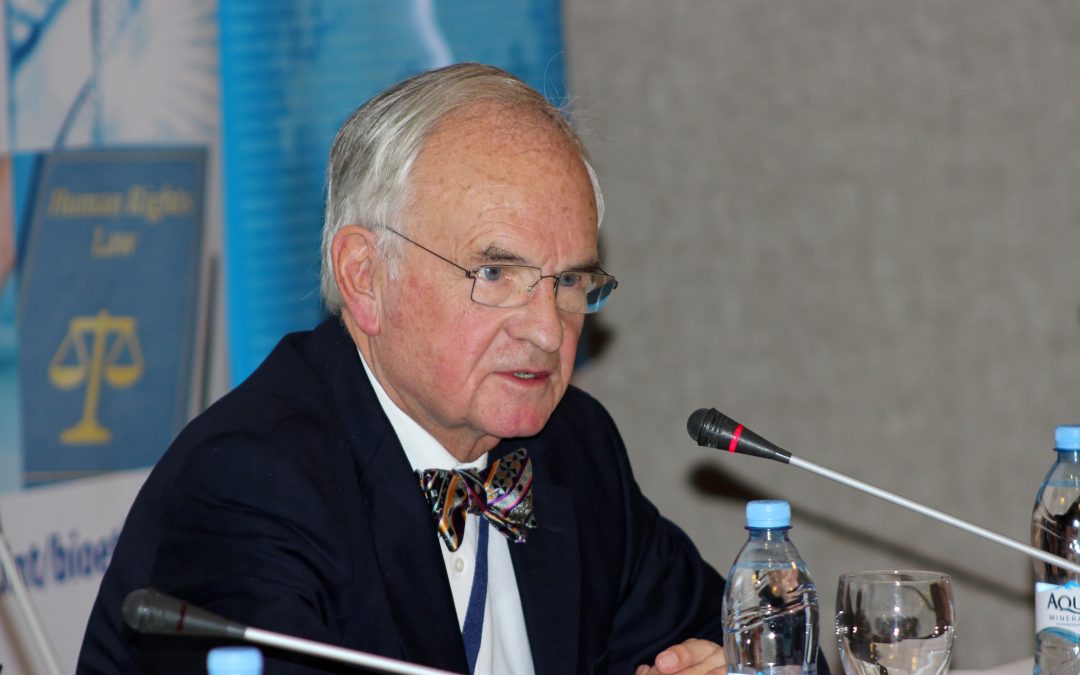Elmar Doppelfeld explains why promoting ethics in science is a challenge that must be tackled on a european level.
How are research ethics promoted on the european level? The President of the “European Network of Research Ethics Committees” (EUREC), Prof. Dr. med. Elmar Doppelfeld, gives insights into the development, challenges and implementation of good scientific practices in Germany and Europe.
What are the goals, objectives and functions of EUREC?
EUREC as a network of national Research Ethics Committees (RECs) associations, networks or comparable initiatives, initially on the level of the European Union and now more and more expanding beyond, promotes capacity building and assistance for local RECs to cooperate in the European research area. This area is at least for the moment predominantly occupied by clinical drug trials or clinical trials on medical devices. However other kinds of medical research involving human beings or using stored biological material of human origin including associated data are included in competence of RECs. The network interlinks European RECs with other bodies relevant for the responsibilities of the RECs like European Commission’s ethical review system and the European Medical Agency (EMA). EUREC has established relationship to the EU-Commission and can be asked by the European Parliament. EUREC uses these interlinks to contribute to an appropriate legislation on European level and to safeguarding the competence and the independence of RECs. EUREC cooperates with organisations which support research ethics. The network forms the infrastructural basis to promote awareness of specific working practices of RECs in Europe, to enhance the shared knowledge basis of European RECs by harmonized education materials, to support coherent reviews and opinions and to meet new challenges and emerging ethical issues. EUREC is not an instance of appeal concerning decisions of national RECs and does not intend to uniform European research ethics instead of harmonisation and better cooperation.
Do national Research Ethics Committees differ in their perspectives and opinions on how research integrity should be defined and implemented? If so, in what respects?
As to my experience, the committees do not differ basically in their perspectives and opinions on definition and implementation on research integrity. The well-known principles for medical research involving human beings – e.g. laid down in the Belmont Report, in the Declaration of Helsinki of the World Medical Association, in the UNESCO Declaration on Bioethics or in legally binding instruments like Regulations of the EU (Drugs and Medical Devices) or the Oviedo Convention of the Council of Europe and national legislation on their basis – are followed. RECs do not express a positive opinion on research projects which would violate these principles. However, their interpretation may be different on good reasons. Concerning the integrity of researchers EUREC cooperates with groups specifically addressing this field.
Where do you see key challenges to foster good scientific practice in Germany as well as in Europe?
The awareness of medical and other researchers for the need of good scientific practice should be enhanced, e.g. during education at the universities. Ethical aspects should become part of all curricula. Independent RECs in Germany and in all European countries could contribute as a partner, not as a controlling instance.
The scientific community has recently experienced cases of scientific fraud. Studies show that the cases of retractions are increasing. What is your explanation for this and how does EUREC react to these?
It is not easy to find an explanation for fraud. Usually economic reasons, promotion of academic career etc. are mentioned. The growing public awareness of the term “scientific fraud” may be a reason for the increase of retractions. The risk to be detected could motivate authors to retract their paper. The RECs do not have a specific competence here. This is the task of Ombudspersons and Research Integrity Offices (RIOs). Therefore, EUREC cooperates extensively with the European network of RIOs (ENRIO) in an EU funded network called ENERI (European Network of Research Ethics and Research Integrity). In this network we discuss in particular the overlapping aspects between RECs and RIOs such as reliability, transparency, honesty or data protection.
Social media offers new ways for scientists to communicate and for the public to talk about scientific results. How does EUREC account for new scientific communication channels?
We did not yet discuss this question in EUREC. Personally, I am in favour of this open discussion under condition that the character of the scientific results is clearly defined: evidence based or preliminary or hope and good perspectives?
Does Germany need to readjust its ethical principles for research in an increasingly digital and intertwined world? Which actors or institutions are in charge or should become active and how?
Ethical principles should never be readjusted for the need of specific research problems or methods. Ethical principles give the frame if and how those methods could be used and implemented. However, we need to consider always a reflective equilibrium between practical cases and theoretical principles. We do not just apply principles on practice. The practice always reflects on the interpretation of the principles. Actually, we start a discussion whether and how an electronic free informed consent of a person to be involved in a medical research project can partially or totally replace the traditional free informed consent “face to face”. The ways we generate an informed consent is always up for discussion. Too often, the process to generate an informed consent is much formalized instead of informing. EUREC just published a volume in the series “Medical Ethics” of the “Permanent Working Party of Medical Research Ethics Committees in the Federal Republic of Germany Incop.” on research with minors and how to meet in these specific cases the requirements of assent and consent.

